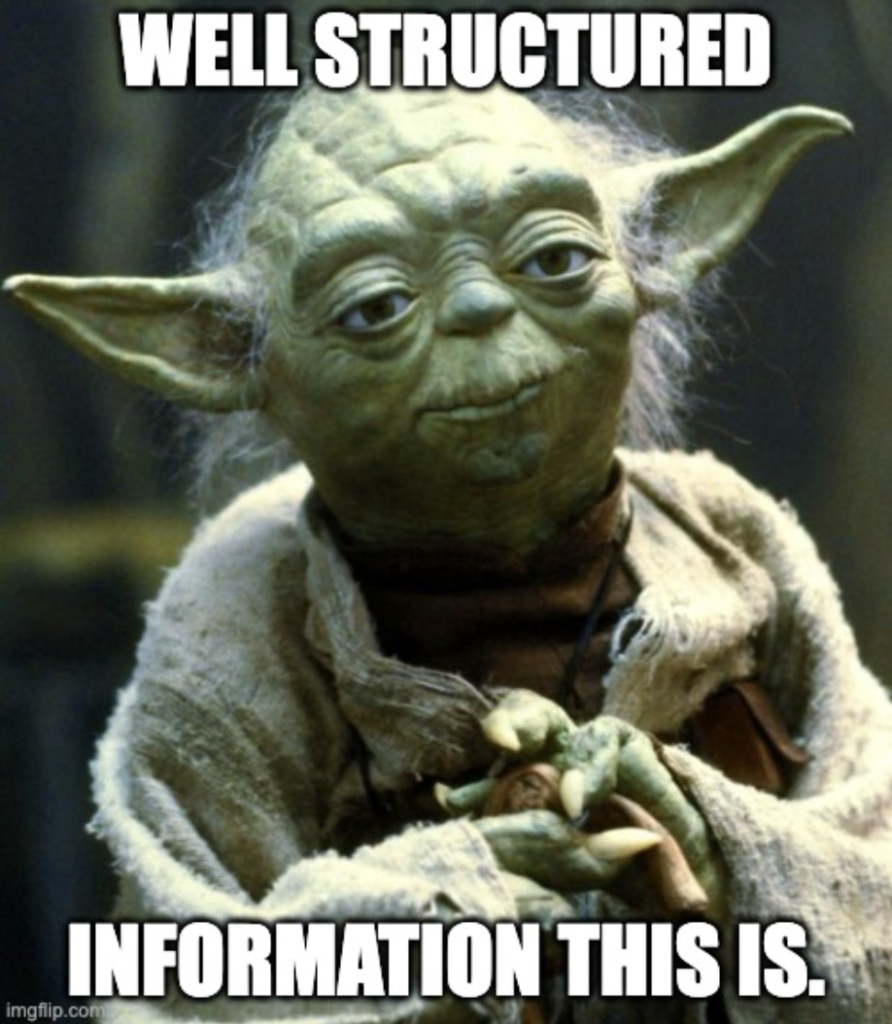How to turn books into digital data (properly)

Our favorite hobby has a lot of analog tendencies, as the name Pen & Paper suggests. That’s why new content is traditionally published in books. But TTRPG is also influenced by modern technologies and with the shift towards playing online more often the contents also change. If your party plays miles or even continents apart, it’s less than ideal to physically send your character sheets, rulebooks and notes to your friends. So the task was to digitalize this data. Since there already was a technology to convert books into digital data in the beginning, most publishers turned to using PDFs. This made their contents available online fast, without really using the advantages of digital products.
The YARPS architecture is created to bring roleplayers and publishers the full potential of online TTRPG content by using a data model that relies on Structured Information.
What is Structured Information?
Structured Information or Structured Data is a term used for information that is digitally stored in a specific way, making it easy for humans and programs to access and use it. In order to achieve this the information is provided in a standardized format, so data can be compared. You can typically find this in databases, like websites with cooking recipes. The standardized format allows you to filter for recipes that do not use a specific ingredient or sort for the dish with the fastest cooking time. You won’t have these options in a printed cook book.
How does this influence my TTRPG?
No matter if you are a GM, a Player or a Publisher, you may be wondering: Why should TTRPG content be stored as Structured Information? There are a lot of benefits YARPS will have in a direct comparison. I decided to focus on the most common use cases while buying a new campaign. In general – after reading it – you will do three main things, while preparing the campaign:
- You want to find something. (What was the strength of that henchman again?)
- You want to change something. (My group will start the campaign in another location.)
- You want to share something. (Anna should already know about the secret society’s hideout.)
Here’s how these use cases work in different media:
Book
A printed book: Besides other literature it’s the traditional form to consume TTRPG content. And don’t get me wrong. We do love the weight of a good novel in our hands while we sit on the balcony in our free time. Most of us won’t trade this for a digital reader. But at the same time we don’t think it’s the ideal media for TTRPG content. Because as roleplayers we want to have an influence on the worlds we play in and this means they need to be interactive. And books are just not really good at that.

If you, for example, want to find information, like a specific attribute, you’ll have to start turning pages. If you’re lucky there’s an index that can help you, otherwise you’ll find it as fast as you can read. This can take some time and isn’t very comfortable.
Once you’ve found that attribute, you might decide to change it. To do so, you’ll need a pen and (preferably) a piece of paper to note stuff down. These notes are just reminders, they won’t change the actual content of the book. You could write directly on the pages, but don’t let that see a librarian!
The process of sharing something written in a book? Easy. Bring the book to the person that’s supposed to read it. Make sure to include all your notes, but remember to tell them what parts not to read. You don’t want to spoil any secrets, do you?
You can think of a PDF as a digital copy of a book. It can offer some advantages and comfort features in comparison to a book.

For one you can search for keywords in a text. This way the information you are looking for will be highlighted and you can jump to the right spots in the text. So you’ll be able to find the information much quicker, which can be very useful during a rpg session.
You can change the content of a PDF – but depending on the type of PDF and your tools at hand, this can be a more or less simple task. In any case if you want to change the value of an attribute you’ll have to change it every time it is mentioned in the text, which can be time consuming and error-prone.
Sharing a PDF can be done easily. You just send a copy of the PDF to your friend, but don’t let that see a publisher! It’s also still the whole content of the book, not just the bit of information you want to share. Also when your friend edits something the changes won’t reflect in your copy.
YARPS
How will Structured Information help to improve this?
If you want to find something in YARPS you can search for keywords, names and aliases or even for linked entries. Meaning you’ll be able to find a character, even if you forgot his name but know in which city he lives in. All content will also be fully sort- and filterable for any of his attributes. Let’s say you have a Star Wars themed instance. You could filter for every character that is using a Lightsaber and sort them by their age for example. A list from YARPS you will get. On top who will be? Already you know.

Of course you can change everything in an entry (if you have the proper editing rights from your GM). YARPS will automatically and instantly update this information everywhere it’s used, referenced or mentioned in your game environment.
To share content in YARPS is especially easy. Invite your friends to your game environment. Decide what they are allowed to see (and edit). Manage visibility and editing rights with a simple click – by user role, groups or individually. You want to share your creations with others besides your TTRPG group? You can always share it with other groups or start to sell your content on the market place. Thanks to our software architecture, you don’t have to fill a whole book before you can offer your contents. Start with a location – like the perfect tavern to start an adventure in – or even with a single character concept. YARPS will automatically tell others how compatible the content is with their playing style (based on genre, game system and existing entries).
As a romantic, I know that I will always appreciate holding a good book in my hands. But digitalization is not just making content available on a screen. So if you want to use your content online, YARPS is the optimal tool to create Structured Information. Your Advanced Role Playing Software will give you much more possibilities to create, manage and market your TTRPG contents in a way that uses its full potential!
All the best,
on behalf of the YARPS team,
Chris